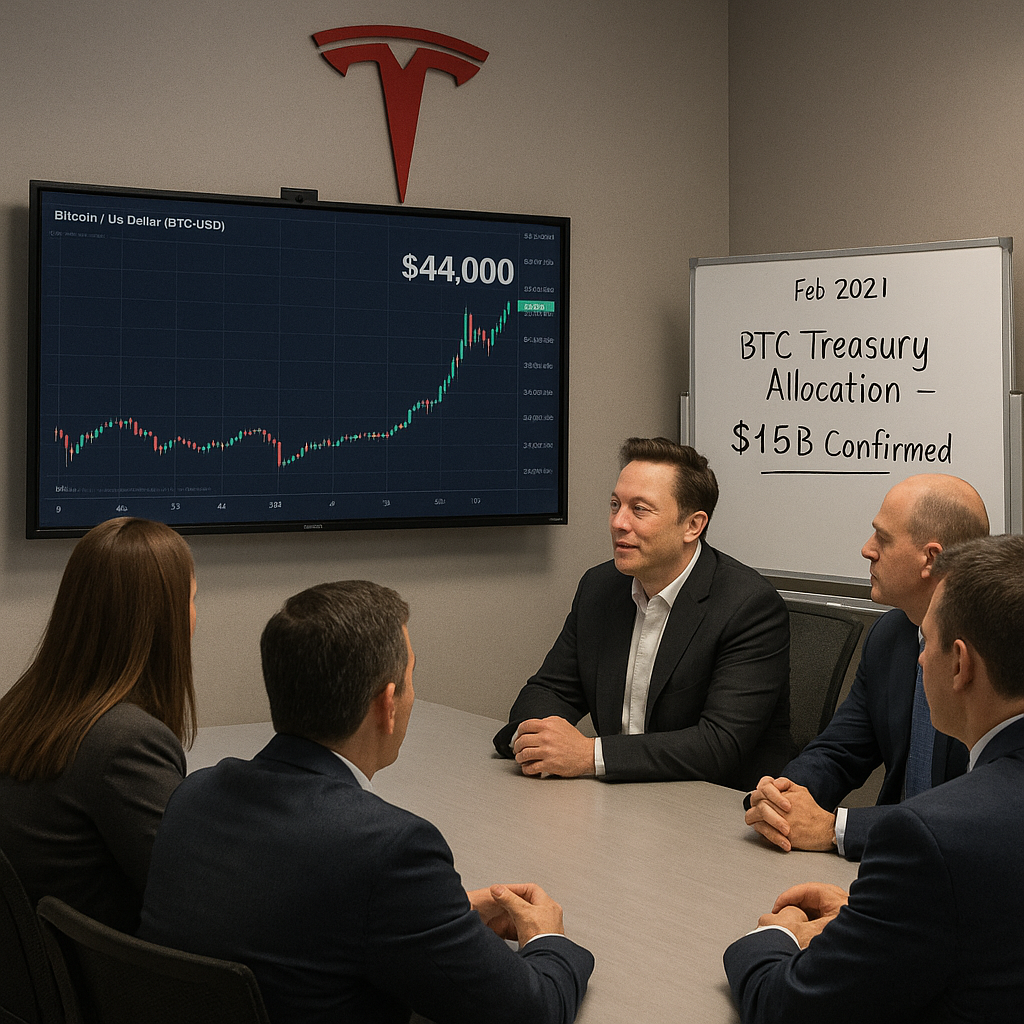Tesla Buys $1.5 Billion in Bitcoin, Sparks Market Surge
February 15, 2021 — In a move that stunned both Wall Street and the crypto world, Tesla Inc. announced it had purchased $1.5 billion worth of Bitcoin, according to a filing with the U.S. Securities and Exchange Commission (SEC). The news, released earlier this month, instantly triggered a double-digit surge in BTC price, propelling the digital asset past $44,000, a new all-time high at the time.
This isn’t just a major investment — it’s a cultural shift. A top-tier publicly traded company with over $800 billion in market capitalization has officially added Bitcoin to its corporate treasury. And not just a small allocation — $1.5 billion represents roughly 7.7% of Tesla’s cash holdings.
Let’s unpack what this means, how we got here, and what might happen next.
Why Did Tesla Buy Bitcoin?
Tesla’s filing revealed two key motivations:
-
Diversifying its cash position
-
Gaining exposure to a long-term store of value
In their own words, the company stated it was seeking “more flexibility to further diversify and maximize returns on our cash.” With interest rates near zero and inflation expectations rising, traditional cash instruments offer little real yield. Bitcoin, with its capped supply and growing adoption, now looks like an attractive alternative.
Tesla also announced plans to begin accepting Bitcoin as payment for its vehicles, making it the first major automaker to do so. This move not only signals confidence in Bitcoin’s value proposition but also boosts its legitimacy as a medium of exchange.
Market Reaction: Bitcoin Rockets Upward
Within hours of the announcement, Bitcoin’s price jumped from $39,000 to over $44,000, setting new records and reigniting bullish sentiment across the crypto ecosystem. Within days, it topped $48,000.
This price movement reflects more than enthusiasm — it represents validation. Tesla’s purchase is being seen as a watershed moment, akin to a tipping point where corporate America can no longer ignore crypto.
Elon Musk’s Influence
The Tesla news cannot be separated from the growing influence of CEO Elon Musk on market sentiment. Over the past few weeks, Musk has:
-
Added #Bitcoin to his Twitter bio
-
Posted pro-crypto memes and commentary
-
Engaged in discussions about Dogecoin and digital assets more broadly
Although some of his tweets may appear lighthearted, they reflect a growing philosophical alignment with decentralized money and a dissatisfaction with legacy financial institutions.
That said, Tesla’s BTC purchase wasn’t just Musk improvising. It followed a formal policy update approved by the board, showing that this was a strategic, well-structured move.
Tesla Isn’t Alone
Tesla may be the most high-profile corporation to buy Bitcoin, but it’s part of a broader trend:
-
MicroStrategy holds over $3 billion in BTC
-
Square allocated $50 million
-
MassMutual, a traditional insurance company, bought $100 million
-
BlackRock has started to “dabble” in Bitcoin via derivatives
This wave of institutional interest suggests that Bitcoin is transitioning from a speculative asset to a legitimate treasury hedge.
Bitcoin in Corporate Balance Sheets: A New Era?
The question now is whether Tesla’s move opens the floodgates for others. Several factors support this hypothesis:
-
Fiat currencies are being debased via unprecedented monetary policy
-
Companies are sitting on large amounts of unproductive cash
-
Bitcoin is increasingly seen as digital gold, but with higher upside
Some analysts predict that even a 1% allocation from Fortune 500 companies could send Bitcoin into six-figure territory. Others caution that regulatory, accounting, and volatility concerns may slow adoption.
Still, conversations are shifting from “Should we?” to “When and how much?”
Risks and Challenges
Tesla’s bold move doesn’t come without risks.
Volatility
Bitcoin remains highly volatile. A drop of 30% in a week is not uncommon. Tesla’s balance sheet is now subject to this volatility, and shareholders will likely have mixed feelings about such exposure.
Regulatory Scrutiny
The U.S. Treasury and SEC are watching crypto closely. If more corporations follow Tesla’s lead, regulators may introduce new frameworks for disclosure, tax treatment, and custody.
Reputation Risk
While sentiment around Bitcoin has improved, some critics still associate it with speculative bubbles, environmental concerns (due to mining energy use), or illicit finance. Tesla now shares in that reputational risk.
What This Means for Crypto Markets
Tesla’s BTC investment is a stamp of legitimacy, arguably even more impactful than PayPal’s crypto launch or the CME’s futures market in 2017.
We are entering a phase where:
-
Bitcoin is a macro asset, not just a tech curiosity
-
Companies feel pressure to act, not just watch
-
Crypto literacy among CFOs and boards is rising
BTC’s market cap is now over $850 billion, nearing parity with companies like Facebook and Tesla itself. If this trend continues, we could see Bitcoin permanently embedded in the global financial system.
What’s Next?
-
More Corporate Allocations
Expect new announcements from tech firms, fintechs, or even traditional retailers testing BTC treasury strategies. -
New On-Ramps for Businesses
Firms like BitPay, NYDIG, and Fidelity Digital Assets are racing to provide corporate-grade crypto services. -
Tax and Accounting Reform
Today, BTC is still classified as an intangible asset under U.S. GAAP. That may soon change under lobbying pressure from Bitcoin-friendly companies. -
BTC as Payment — Reality or Gimmick?
Tesla accepting BTC for vehicles will be a case study in real-world crypto commerce. How many customers will actually spend BTC versus hold?
Final Thoughts
Tesla’s $1.5 billion Bitcoin purchase marks a defining moment in crypto history. It validates the asset at the highest levels of business and triggers a new wave of institutional FOMO.
While it remains to be seen how many companies will follow — or whether BTC’s volatility will backfire — the symbolic importance is undeniable.
Bitcoin is no longer a niche financial experiment.
It’s a corporate asset class — and the new standard has been set.
